Deck 14: Partial Derivatives
Question
Question
Question
Question
Question
Question
Question
Question
Question
Question
Question
Question
Question
Question
Question
Question
Question
Question
Question
Question
Question
Question
Question
Question
Question
Question
Question
Question
Question
Question
Question
Question
Question
Question
Question
Question
Question
Question
Question
Question
Question
Question
Question
Question
Question
Question
Question
Question
Question
Question
Question
Question
Question
Question
Question
Question
Question
Question
Question
Question
Question
Question
Question
Question
Question
Question
Question
Question
Question
Question
Question
Question
Question
Question
Question
Question
Question
Question
Question
Question

Unlock Deck
Sign up to unlock the cards in this deck!
Unlock Deck
Unlock Deck
1/158
Play
Full screen (f)
Deck 14: Partial Derivatives
1
If 


2
Find the second partial derivatives of the function 


3
Find three positive real numbers whose sum is 388 and whose product is as large as possible.

4
Find the differential of the function. 


Unlock Deck
Unlock for access to all 158 flashcards in this deck.
Unlock Deck
k this deck
5
Describe the level survaces of the function 


Unlock Deck
Unlock for access to all 158 flashcards in this deck.
Unlock Deck
k this deck
6
Find the local maximum, and minimum value and saddle points of the function. 


Unlock Deck
Unlock for access to all 158 flashcards in this deck.
Unlock Deck
k this deck
7
Use partial derivatives to find the implicit derivative 




Unlock Deck
Unlock for access to all 158 flashcards in this deck.
Unlock Deck
k this deck
8
Find the first partial derivatives of the function. 


Unlock Deck
Unlock for access to all 158 flashcards in this deck.
Unlock Deck
k this deck
9
Find the first partial derivatives of the function 


Unlock Deck
Unlock for access to all 158 flashcards in this deck.
Unlock Deck
k this deck
10
Find the differential of the function 


Unlock Deck
Unlock for access to all 158 flashcards in this deck.
Unlock Deck
k this deck
11
Use Lagrange multipliers to find the maximum and minimum values of the function  subject to the constraints
subject to the constraints 
 subject to the constraints
subject to the constraints 

Unlock Deck
Unlock for access to all 158 flashcards in this deck.
Unlock Deck
k this deck
12
Find the gradient of 


Unlock Deck
Unlock for access to all 158 flashcards in this deck.
Unlock Deck
k this deck
13
Find the equation of the normal line to the given surface at the specified point. 


Unlock Deck
Unlock for access to all 158 flashcards in this deck.
Unlock Deck
k this deck
14
Determine where the function  is continuous.
is continuous.
 is continuous.
is continuous.
Unlock Deck
Unlock for access to all 158 flashcards in this deck.
Unlock Deck
k this deck
15
The length l, width w and height h of a box change with time.At a certain instant the dimensions are  nd l and w are increasing at a rate of 10 m/s while h is decreasing at a rate of 1 m/s.At that instant find the rates at which the surface area is changing.
nd l and w are increasing at a rate of 10 m/s while h is decreasing at a rate of 1 m/s.At that instant find the rates at which the surface area is changing.
 nd l and w are increasing at a rate of 10 m/s while h is decreasing at a rate of 1 m/s.At that instant find the rates at which the surface area is changing.
nd l and w are increasing at a rate of 10 m/s while h is decreasing at a rate of 1 m/s.At that instant find the rates at which the surface area is changing.
Unlock Deck
Unlock for access to all 158 flashcards in this deck.
Unlock Deck
k this deck
16
Use implicit differentiation to find 




Unlock Deck
Unlock for access to all 158 flashcards in this deck.
Unlock Deck
k this deck
17
Sketch the graph of the function 


Unlock Deck
Unlock for access to all 158 flashcards in this deck.
Unlock Deck
k this deck
18
Find all the second partial derivatives. 


Unlock Deck
Unlock for access to all 158 flashcards in this deck.
Unlock Deck
k this deck
19
Find the differential of the function 


Unlock Deck
Unlock for access to all 158 flashcards in this deck.
Unlock Deck
k this deck
20
Find three positive numbers whose sum is  and whose product is a maximum.
and whose product is a maximum.
 and whose product is a maximum.
and whose product is a maximum.
Unlock Deck
Unlock for access to all 158 flashcards in this deck.
Unlock Deck
k this deck
21
Find an equation of the tangent plane to the given surface at the specified point. 


Unlock Deck
Unlock for access to all 158 flashcards in this deck.
Unlock Deck
k this deck
22
Find the limit. 


Unlock Deck
Unlock for access to all 158 flashcards in this deck.
Unlock Deck
k this deck
23
Use Lagrange multipliers to find the minimum value of the function subject to the given constraints. 


Unlock Deck
Unlock for access to all 158 flashcards in this deck.
Unlock Deck
k this deck
24
Use Lagrange multipliers to find the maximum and the minimum of f subject to the given constraint(s). 


Unlock Deck
Unlock for access to all 158 flashcards in this deck.
Unlock Deck
k this deck
25
Find 


Unlock Deck
Unlock for access to all 158 flashcards in this deck.
Unlock Deck
k this deck
26
The  (or humidex, for short) is the perceived air temperature when the actual temperature is T and the relative humidity is h, so we can write
(or humidex, for short) is the perceived air temperature when the actual temperature is T and the relative humidity is h, so we can write  The following table of values of I is an excerpt from a table compiled by the National Oceanic and Atmospheric Administration.For what value of T is
The following table of values of I is an excerpt from a table compiled by the National Oceanic and Atmospheric Administration.For what value of T is 
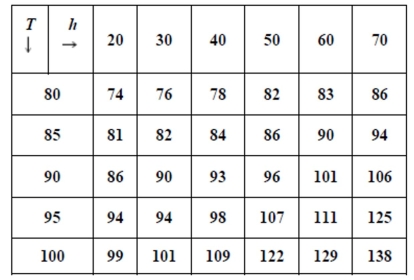
 (or humidex, for short) is the perceived air temperature when the actual temperature is T and the relative humidity is h, so we can write
(or humidex, for short) is the perceived air temperature when the actual temperature is T and the relative humidity is h, so we can write  The following table of values of I is an excerpt from a table compiled by the National Oceanic and Atmospheric Administration.For what value of T is
The following table of values of I is an excerpt from a table compiled by the National Oceanic and Atmospheric Administration.For what value of T is 


Unlock Deck
Unlock for access to all 158 flashcards in this deck.
Unlock Deck
k this deck
27
Find the linearization L(x, y) of the function at the given point.  Round theAnswers to the nearest hundredth.
Round theAnswers to the nearest hundredth.
 Round theAnswers to the nearest hundredth.
Round theAnswers to the nearest hundredth.
Unlock Deck
Unlock for access to all 158 flashcards in this deck.
Unlock Deck
k this deck
28
Find the differential of the function. 


Unlock Deck
Unlock for access to all 158 flashcards in this deck.
Unlock Deck
k this deck
29
Use the Chain Rule to find 




Unlock Deck
Unlock for access to all 158 flashcards in this deck.
Unlock Deck
k this deck
30
Find  for the function
for the function 
 for the function
for the function 

Unlock Deck
Unlock for access to all 158 flashcards in this deck.
Unlock Deck
k this deck
31
Determine the largest set on which the function is continuous. 


Unlock Deck
Unlock for access to all 158 flashcards in this deck.
Unlock Deck
k this deck
32
Find the first partial derivatives of the function. 


Unlock Deck
Unlock for access to all 158 flashcards in this deck.
Unlock Deck
k this deck
33
Use polar coordinates to find the limit. 


Unlock Deck
Unlock for access to all 158 flashcards in this deck.
Unlock Deck
k this deck
34


Unlock Deck
Unlock for access to all 158 flashcards in this deck.
Unlock Deck
k this deck
35
The wind-chill index I is the perceived temperature when the actual temperature is T and the wind speed is v so we can write  The following table of values is an excerpt from a table compiled by the National Atmospheric and Oceanic Administration.Use the table to find a linear approximation
The following table of values is an excerpt from a table compiled by the National Atmospheric and Oceanic Administration.Use the table to find a linear approximation  to the wind chill index function when T is near
to the wind chill index function when T is near  and v is near 30 kmh.
and v is near 30 kmh. 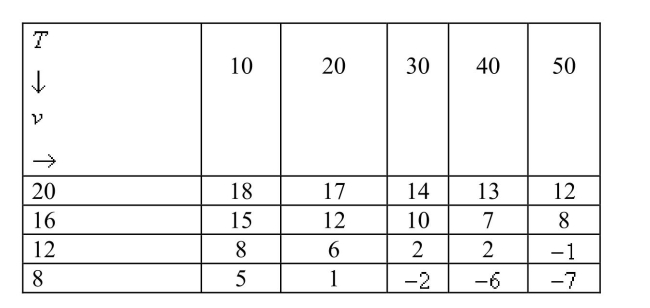
 The following table of values is an excerpt from a table compiled by the National Atmospheric and Oceanic Administration.Use the table to find a linear approximation
The following table of values is an excerpt from a table compiled by the National Atmospheric and Oceanic Administration.Use the table to find a linear approximation  to the wind chill index function when T is near
to the wind chill index function when T is near  and v is near 30 kmh.
and v is near 30 kmh. 

Unlock Deck
Unlock for access to all 158 flashcards in this deck.
Unlock Deck
k this deck
36
Use the linearization L(x, y) of the function. 


Unlock Deck
Unlock for access to all 158 flashcards in this deck.
Unlock Deck
k this deck
37
Find 


Unlock Deck
Unlock for access to all 158 flashcards in this deck.
Unlock Deck
k this deck
38
Find the equation of the normal line to the given surface at the specified point. 


Unlock Deck
Unlock for access to all 158 flashcards in this deck.
Unlock Deck
k this deck
39
Use Lagrange multipliers to find the maximum value of the function subject to the given constraints. 


Unlock Deck
Unlock for access to all 158 flashcards in this deck.
Unlock Deck
k this deck
40
Find three positive numbers whose sum is  and whose product is a maximum.
and whose product is a maximum.
 and whose product is a maximum.
and whose product is a maximum.
Unlock Deck
Unlock for access to all 158 flashcards in this deck.
Unlock Deck
k this deck
41
Select the correct Answer: for each question.
Suppose that over a certain region of space the electrical potential V is given by Find the rate of change of the potential at
Find the rate of change of the potential at  in the direction of the vector
in the direction of the vector 
A)
B)
C)44
D)20
E)-0.96
Suppose that over a certain region of space the electrical potential V is given by
 Find the rate of change of the potential at
Find the rate of change of the potential at  in the direction of the vector
in the direction of the vector 
A)

B)

C)44
D)20
E)-0.96

Unlock Deck
Unlock for access to all 158 flashcards in this deck.
Unlock Deck
k this deck
42
Select the correct Answer: for each question.
Find the directional derivative of the function at the point
at the point  in the direction of the unit vector that makes the angle
in the direction of the unit vector that makes the angle  with the positive x-axis.
with the positive x-axis.
A)
B)13
C)1
D)
Find the directional derivative of the function
 at the point
at the point  in the direction of the unit vector that makes the angle
in the direction of the unit vector that makes the angle  with the positive x-axis.
with the positive x-axis.A)

B)13
C)1
D)


Unlock Deck
Unlock for access to all 158 flashcards in this deck.
Unlock Deck
k this deck
43
Select the correct Answer: for each question.
Find the indicated partial derivative.
A)
B)
C)
D)
E)
Find the indicated partial derivative.

A)

B)

C)

D)

E)


Unlock Deck
Unlock for access to all 158 flashcards in this deck.
Unlock Deck
k this deck
44
Select the correct Answer: for each question.
Find equations for the tangent plane and the normal line to the surface with equation at the point
at the point 
A)
B)
C)
D)
Find equations for the tangent plane and the normal line to the surface with equation
 at the point
at the point 
A)

B)

C)

D)


Unlock Deck
Unlock for access to all 158 flashcards in this deck.
Unlock Deck
k this deck
45
Select the correct Answer: for each question.
Find the limit
A)52
B)16
C)73
D)19
Find the limit

A)52
B)16
C)73
D)19

Unlock Deck
Unlock for access to all 158 flashcards in this deck.
Unlock Deck
k this deck
46
Select the correct Answer: for each question.
Find the gradient of the function
A)
B)
C)
D)
E)
Find the gradient of the function

A)

B)

C)

D)

E)


Unlock Deck
Unlock for access to all 158 flashcards in this deck.
Unlock Deck
k this deck
47
Select the correct Answer: for each question.
Find three positive numbers whose sum is and whose product is a maximum.
and whose product is a maximum.
A)
B)
C)
D)
E)
Find three positive numbers whose sum is
 and whose product is a maximum.
and whose product is a maximum.A)

B)

C)

D)

E)


Unlock Deck
Unlock for access to all 158 flashcards in this deck.
Unlock Deck
k this deck
48
Select the correct Answer: for each question.
Find and classify the relative extrema and saddle points of the function
A)None
B) Relative maximum
Relative maximum
C)Saddle point Relative minimum
Relative minimum
D)
Find and classify the relative extrema and saddle points of the function

A)None
B)
 Relative maximum
Relative maximumC)Saddle point
 Relative minimum
Relative minimumD)


Unlock Deck
Unlock for access to all 158 flashcards in this deck.
Unlock Deck
k this deck
49
Select the correct Answer: for each question.
Use the Chain Rule to find

A)
B)
C)
D)
E)
Use the Chain Rule to find


A)

B)

C)

D)

E)


Unlock Deck
Unlock for access to all 158 flashcards in this deck.
Unlock Deck
k this deck
50
Select the correct Answer: for each question.
Evaluate the limit.
A)
B)0
C)
D)
E)
Evaluate the limit.

A)

B)0
C)

D)

E)


Unlock Deck
Unlock for access to all 158 flashcards in this deck.
Unlock Deck
k this deck
51
Select the correct Answer: for each question.
Find
A)
B)
C)
D)
E)0
Find

A)

B)

C)

D)

E)0

Unlock Deck
Unlock for access to all 158 flashcards in this deck.
Unlock Deck
k this deck
52
Select the correct Answer: for each question.
Find the limit
A)
B)
C)
D)
Find the limit

A)

B)

C)

D)


Unlock Deck
Unlock for access to all 158 flashcards in this deck.
Unlock Deck
k this deck
53
Select the correct Answer: for each question.
Find the maximum rate of change of at the point
at the point  In what direction does it occur?
In what direction does it occur?
A)
B)
C)
D)
E)none of these
Find the maximum rate of change of
 at the point
at the point  In what direction does it occur?
In what direction does it occur?A)

B)

C)

D)

E)none of these

Unlock Deck
Unlock for access to all 158 flashcards in this deck.
Unlock Deck
k this deck
54
Select the correct Answer: for each question.
Let Find
Find 
A)
B)
C)36
D)6
Let
 Find
Find 
A)

B)

C)36
D)6

Unlock Deck
Unlock for access to all 158 flashcards in this deck.
Unlock Deck
k this deck
55
Select the correct Answer: for each question.
Use differentials to estimate the amount of metal in a closed cylindrical can that is 12 cm high and 8 cm in diameter if the metal in the top and bottom is 0.09 cm thick and the metal in the sides is 0.01 cm thick.(rounded to the nearest hundredth.)
A)8.34
B)6.99
C)6.91
D)6.7
E)
Use differentials to estimate the amount of metal in a closed cylindrical can that is 12 cm high and 8 cm in diameter if the metal in the top and bottom is 0.09 cm thick and the metal in the sides is 0.01 cm thick.(rounded to the nearest hundredth.)
A)8.34

B)6.99

C)6.91

D)6.7

E)


Unlock Deck
Unlock for access to all 158 flashcards in this deck.
Unlock Deck
k this deck
56
Select the correct Answer: for each question.
The ellipsoid intersects the plane
intersects the plane  in an ellipse.Find parametric equations for the tangent line to this ellipse at the point (1, 2, 2).
in an ellipse.Find parametric equations for the tangent line to this ellipse at the point (1, 2, 2).
A)
B)
C)
D)
E)
The ellipsoid
 intersects the plane
intersects the plane  in an ellipse.Find parametric equations for the tangent line to this ellipse at the point (1, 2, 2).
in an ellipse.Find parametric equations for the tangent line to this ellipse at the point (1, 2, 2).A)

B)

C)

D)

E)


Unlock Deck
Unlock for access to all 158 flashcards in this deck.
Unlock Deck
k this deck
57
Select the correct Answer: for each question.
Let
A)
B)
C)
D)
Let

A)

B)

C)

D)


Unlock Deck
Unlock for access to all 158 flashcards in this deck.
Unlock Deck
k this deck
58
Select the correct Answer: for each question.
A boundary stripe 2 in.wide is painted around a rectangle whose dimensions are 100 ft by 240 ft.Use differentials to approximate the number of square feet of paint in the stripe.
A)113
B)113.81
C)113.22
D)113.89
E)113.33
A boundary stripe 2 in.wide is painted around a rectangle whose dimensions are 100 ft by 240 ft.Use differentials to approximate the number of square feet of paint in the stripe.
A)113

B)113.81

C)113.22

D)113.89

E)113.33


Unlock Deck
Unlock for access to all 158 flashcards in this deck.
Unlock Deck
k this deck
59
Select the correct Answer: for each question.
Find the limit Hint: If
Hint: If  if and only if
if and only if 
A)
B)0
C)
D)1
Find the limit
 Hint: If
Hint: If  if and only if
if and only if 
A)

B)0
C)

D)1

Unlock Deck
Unlock for access to all 158 flashcards in this deck.
Unlock Deck
k this deck
60
Select the correct Answer: for each question.
Find the domain and range of the function
A)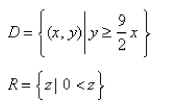
B)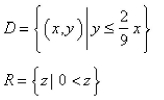
C)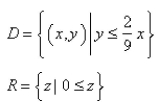
D)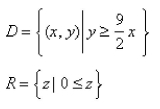
Find the domain and range of the function

A)

B)

C)

D)


Unlock Deck
Unlock for access to all 158 flashcards in this deck.
Unlock Deck
k this deck
61
Select the correct Answer: for each question.
Find equations for the tangent plane and the normal line to the surface with equation at the point
at the point 
A)
B)
C)
D)
Find equations for the tangent plane and the normal line to the surface with equation
 at the point
at the point 
A)

B)

C)

D)


Unlock Deck
Unlock for access to all 158 flashcards in this deck.
Unlock Deck
k this deck
62
Select the correct Answer: for each question.
Use implicit differentiation to find

A)
B)
C)
D)
Use implicit differentiation to find


A)

B)

C)

D)


Unlock Deck
Unlock for access to all 158 flashcards in this deck.
Unlock Deck
k this deck
63
Select the correct Answer: for each question.
Use the Chain Rule to find

A)
B)
C)
D)
E)
Use the Chain Rule to find


A)

B)

C)

D)

E)


Unlock Deck
Unlock for access to all 158 flashcards in this deck.
Unlock Deck
k this deck
64
Select the correct Answer: for each question.
At what point is the following function a local maximum?
A)
B)
C)
D)
E)
At what point is the following function a local maximum?

A)

B)

C)

D)

E)


Unlock Deck
Unlock for access to all 158 flashcards in this deck.
Unlock Deck
k this deck
65
Select the correct Answer: for each question.
Use a table of numerical values of f (x, y) for (x, y) near the origin to make a conjecture about the value of the limit of f (x, y) as

A)
B)
C)1
D)
E)the value cannot be determined
Use a table of numerical values of f (x, y) for (x, y) near the origin to make a conjecture about the value of the limit of f (x, y) as


A)

B)

C)1
D)

E)the value cannot be determined

Unlock Deck
Unlock for access to all 158 flashcards in this deck.
Unlock Deck
k this deck
66
Select the correct Answer: for each question.
Find and classify the relative extrema and saddle points of the function
A)None
B) Relative maximum
Relative maximum
C)Saddle point Relative minimum
Relative minimum
D)
Find and classify the relative extrema and saddle points of the function

A)None
B)
 Relative maximum
Relative maximumC)Saddle point
 Relative minimum
Relative minimumD)


Unlock Deck
Unlock for access to all 158 flashcards in this deck.
Unlock Deck
k this deck
67
Select the correct Answer: for each question.
A boundary stripe 2 in.wide is painted around a rectangle whose dimensions are 100 ft by 240 ft.Use differentials to approximate the number of square feet of paint in the stripe.
A)113
B)113.81
C)113.22
D)113.89
E)113.33
A boundary stripe 2 in.wide is painted around a rectangle whose dimensions are 100 ft by 240 ft.Use differentials to approximate the number of square feet of paint in the stripe.
A)113

B)113.81

C)113.22

D)113.89

E)113.33


Unlock Deck
Unlock for access to all 158 flashcards in this deck.
Unlock Deck
k this deck
68
Select the correct Answer: for each question.
Use differentials to estimate the amount of metal in a closed cylindrical can that is 12 cm high and 8 cm in diameter if the metal in the top and bottom is 0.09 cm thick and the metal in the sides is 0.01 cm thick.(rounded to the nearest hundredth.)
A)8.34
B)6.99
C)6.91
D)6.7
E)
Use differentials to estimate the amount of metal in a closed cylindrical can that is 12 cm high and 8 cm in diameter if the metal in the top and bottom is 0.09 cm thick and the metal in the sides is 0.01 cm thick.(rounded to the nearest hundredth.)
A)8.34

B)6.99

C)6.91

D)6.7

E)


Unlock Deck
Unlock for access to all 158 flashcards in this deck.
Unlock Deck
k this deck
69
Select the correct Answer: for each question.
Use the equation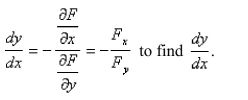

A)
B)
C)
D)
E)
Use the equation


A)

B)

C)

D)

E)


Unlock Deck
Unlock for access to all 158 flashcards in this deck.
Unlock Deck
k this deck
70
Select the correct Answer: for each question.
Find the directional derivative of at the point (1, 3) in the direction toward the point (3, 1).Select the correct Answer
at the point (1, 3) in the direction toward the point (3, 1).Select the correct Answer
A)
B)
C)
D)28
E)none of these
Find the directional derivative of
 at the point (1, 3) in the direction toward the point (3, 1).Select the correct Answer
at the point (1, 3) in the direction toward the point (3, 1).Select the correct AnswerA)

B)

C)

D)28
E)none of these

Unlock Deck
Unlock for access to all 158 flashcards in this deck.
Unlock Deck
k this deck
71
Let  Select the correct Answer
Select the correct Answer
A)
B)
C)
D)
 Select the correct Answer
Select the correct AnswerA)

B)

C)

D)


Unlock Deck
Unlock for access to all 158 flashcards in this deck.
Unlock Deck
k this deck
72
Select the correct Answer: for each question.
Use the Chain Rule to find

A)
B)
C)
D)
E)
Use the Chain Rule to find


A)

B)

C)

D)

E)


Unlock Deck
Unlock for access to all 158 flashcards in this deck.
Unlock Deck
k this deck
73
Select the correct Answer: for each question.
If use the gradient vector
use the gradient vector  to find the tangent line to the level curve
to find the tangent line to the level curve  at the point
at the point 
A)
B)
C)
D)
E)
If
 use the gradient vector
use the gradient vector  to find the tangent line to the level curve
to find the tangent line to the level curve  at the point
at the point 
A)

B)

C)

D)

E)


Unlock Deck
Unlock for access to all 158 flashcards in this deck.
Unlock Deck
k this deck
74
Select the correct Answer: for each question.
If R is the total resistance of three resistors, connected in parallel, with resistances then
then  If the resistances are measured in ohms as
If the resistances are measured in ohms as  with a possible error of 0.8% in each case, estimate the maximum error in the calculated value of R.
with a possible error of 0.8% in each case, estimate the maximum error in the calculated value of R.
A)0.347
B)0.476
C)0.291
D)0.098
E)0.957
If R is the total resistance of three resistors, connected in parallel, with resistances
 then
then  If the resistances are measured in ohms as
If the resistances are measured in ohms as  with a possible error of 0.8% in each case, estimate the maximum error in the calculated value of R.
with a possible error of 0.8% in each case, estimate the maximum error in the calculated value of R.A)0.347

B)0.476

C)0.291

D)0.098

E)0.957


Unlock Deck
Unlock for access to all 158 flashcards in this deck.
Unlock Deck
k this deck
75
Select the correct Answer: for each question.
The height of a hill (in feet) is given by where x is the distance (in miles) east and y is the distance (in miles) north of your cabin.If you are at a point on the hill 1 mile north and 1 mile east of your cabin, what is the rate of change of the height of the hill (a) in a northerly direction and (b) in an easterly direction?
where x is the distance (in miles) east and y is the distance (in miles) north of your cabin.If you are at a point on the hill 1 mile north and 1 mile east of your cabin, what is the rate of change of the height of the hill (a) in a northerly direction and (b) in an easterly direction?
A)(a) 570 ft/mi, (b) 690 ft/mi
B)(a) -570 ft/mi, (b) 690 ft/mi
C)(a) 690 ft/mi, (b) 570 ft/mi
D)(a) 690 ft/mi, (b) -570 ft/mi
The height of a hill (in feet) is given by
 where x is the distance (in miles) east and y is the distance (in miles) north of your cabin.If you are at a point on the hill 1 mile north and 1 mile east of your cabin, what is the rate of change of the height of the hill (a) in a northerly direction and (b) in an easterly direction?
where x is the distance (in miles) east and y is the distance (in miles) north of your cabin.If you are at a point on the hill 1 mile north and 1 mile east of your cabin, what is the rate of change of the height of the hill (a) in a northerly direction and (b) in an easterly direction?A)(a) 570 ft/mi, (b) 690 ft/mi
B)(a) -570 ft/mi, (b) 690 ft/mi
C)(a) 690 ft/mi, (b) 570 ft/mi
D)(a) 690 ft/mi, (b) -570 ft/mi

Unlock Deck
Unlock for access to all 158 flashcards in this deck.
Unlock Deck
k this deck
76
Select the correct Answer: for each question.
Find the indicated partial derivative.
A)
B)
C)
D)
E)
Find the indicated partial derivative.

A)

B)

C)

D)

E)


Unlock Deck
Unlock for access to all 158 flashcards in this deck.
Unlock Deck
k this deck
77
Select the correct Answer: for each question.
Use Lagrange multipliers to find the maximum value of the function subject to the given constraint.
A)
B)
C)
D)
E)
Use Lagrange multipliers to find the maximum value of the function subject to the given constraint.

A)

B)

C)

D)

E)


Unlock Deck
Unlock for access to all 158 flashcards in this deck.
Unlock Deck
k this deck
78
Select the correct Answer: for each question.
Evaluate the limit.
A)2
B)the limit does not exist
C)
D)1
E)0
Evaluate the limit.

A)2
B)the limit does not exist
C)

D)1
E)0

Unlock Deck
Unlock for access to all 158 flashcards in this deck.
Unlock Deck
k this deck
79
Select the correct Answer: for each question.
Use the Chain Rule to find

A)
B)
C)
D)
Use the Chain Rule to find


A)

B)

C)

D)


Unlock Deck
Unlock for access to all 158 flashcards in this deck.
Unlock Deck
k this deck
80
Select the correct Answer: for each question.
Find the domain and range of the function
A)
B)
C)
D)
Find the domain and range of the function

A)

B)

C)

D)


Unlock Deck
Unlock for access to all 158 flashcards in this deck.
Unlock Deck
k this deck


